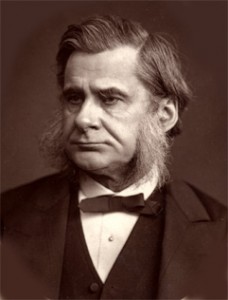 Ask the average person on the street to name the foremost atheists of our day, and they probably will list the likes of Oxford biologist Richard Dawkins, philosopher Daniel Dennett, the late literary critic Christopher Hitchens, or neuroscientist Sam Harris. If you had asked the person on the street in the nineteenth century the same question, there is no doubt that the name at the top of the list would be T. H. Huxley. Although he does not enjoy the same sort of name recognition as the more recent atheists, Huxley in his own day was an outspoken and leading critic of the Christian faith. In fact, his championing of Darwin’s theory of evolution earned him the nickname “Darwin’s Bulldog,” and he coined the term “agnostic” (meaning that we simply cannot know whether or not God exists) to describe his own view.
Ask the average person on the street to name the foremost atheists of our day, and they probably will list the likes of Oxford biologist Richard Dawkins, philosopher Daniel Dennett, the late literary critic Christopher Hitchens, or neuroscientist Sam Harris. If you had asked the person on the street in the nineteenth century the same question, there is no doubt that the name at the top of the list would be T. H. Huxley. Although he does not enjoy the same sort of name recognition as the more recent atheists, Huxley in his own day was an outspoken and leading critic of the Christian faith. In fact, his championing of Darwin’s theory of evolution earned him the nickname “Darwin’s Bulldog,” and he coined the term “agnostic” (meaning that we simply cannot know whether or not God exists) to describe his own view.
Although Huxley was famous in his day for his lack of belief in God, in at least one respect he was notably different than the anti-theists today. Huxley did not believe the supernatural claims made in the Bible, but he still advocated the centrality of the Bible in the education of children. In his 2011 publication, A People of One Book: The Bible and the Victorians, historian Timothy Larsen highlights Huxley’s conflicted relationship to the Bible. As Larsen demonstrates, Victorian doubters like Huxley might have rejected traditional belief in Christianity, but they seemed unable to escape the pervasive influence of the Bible, and at times even revered the book.
A good illustration of Huxley’s ongoing respect for the Bible comes from the year 1870 when compulsory state education of children was enacted into law in England. Huxley served on the London School Board to oversee this new endeavor, and wrote an article titled “The School Boards: What They Can Do, and What They May Do.” In it, Huxley insisted that the Bible must be included in the core curriculum of the state schools, and suggested that he would rather his own children have an education that included the Bible rather than a purely secular one, even if such Bible training involved instruction in what he regarded as misguided theological ideas. Huxley explained why he had such high regard for the Bible:
“I must confess I have been no less seriously perplexed to know by what practical measures the religious feeling, which is the essential basis of conduct, was to be kept up, in the present utterly chaotic state of opinion on these matters, without the use of the Bible . . . Take the Bible as a whole; make the severest deductions which fair criticism can dictate for shortcomings and positive errors; eliminate, as a sensible lay-teacher would do, if left to himself, all that is not desirable for children to occupy themselves with; and there still remains in this old literature a vast residuum of moral beauty and grandeur.”
Even Huxley, who popularized the idea that humans can’t know whether or not God exists, nevertheless saw in the Bible a distinct “moral beauty and grandeur” and recognized its indispensable place at the foundation of Western civilization and its usefulness in guiding conduct amidst a “chaotic state of opinion.” If Huxley thought education in the Bible was necessary in his own day, how much more so today in light of the further decline of biblical literacy in the West.